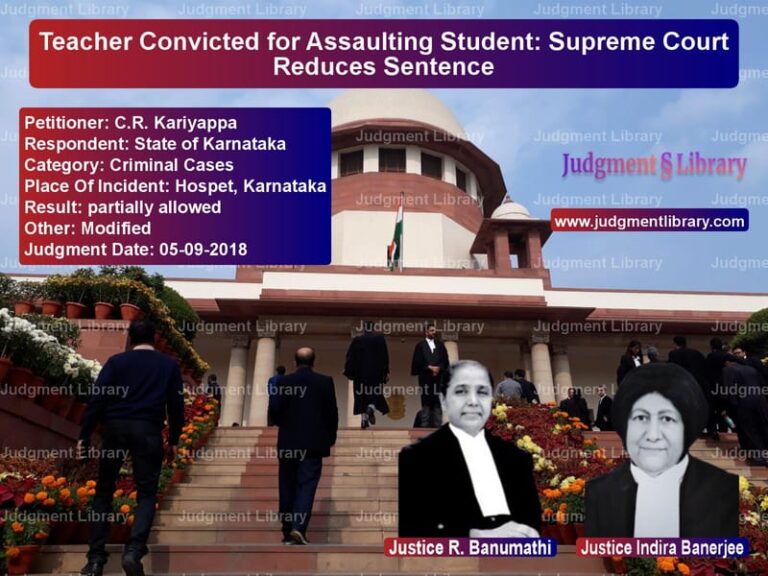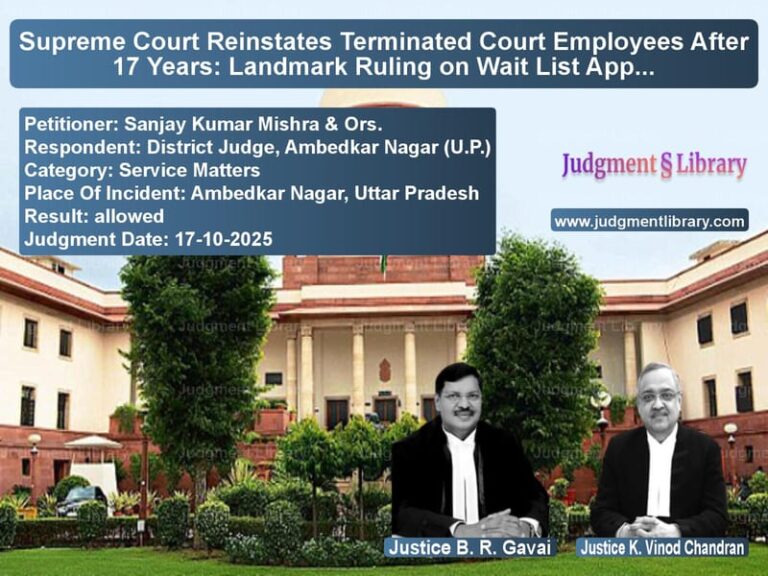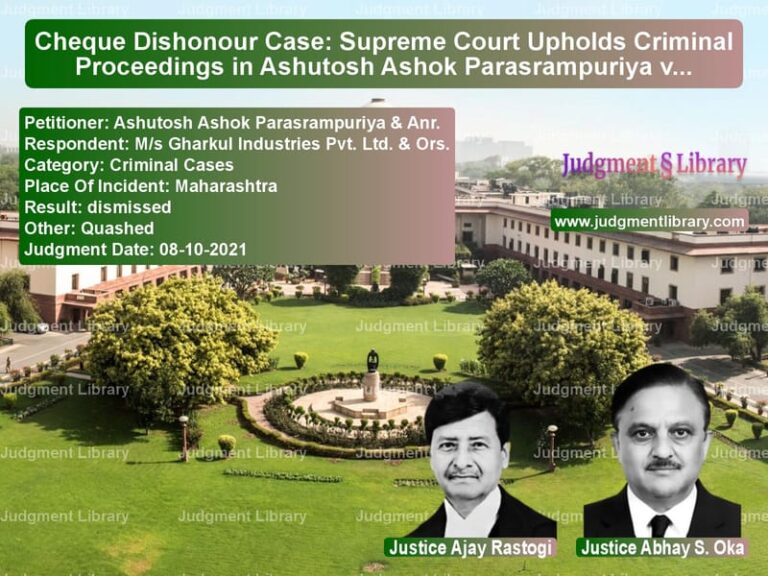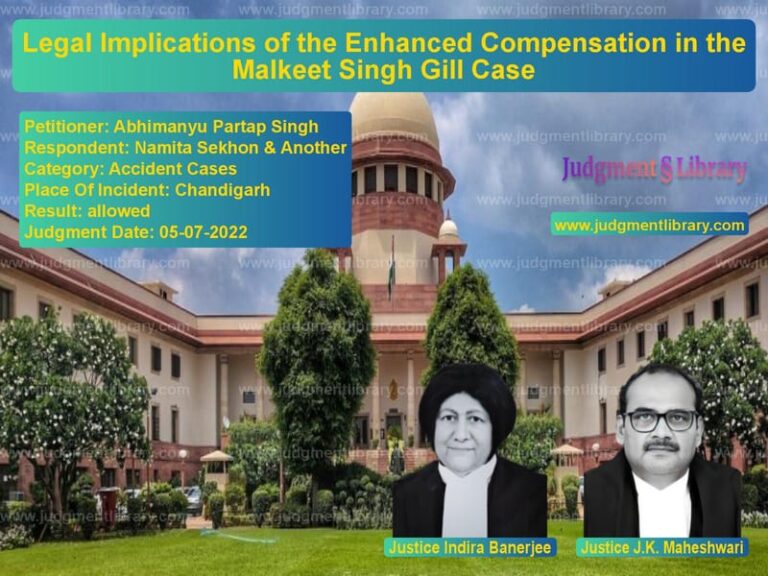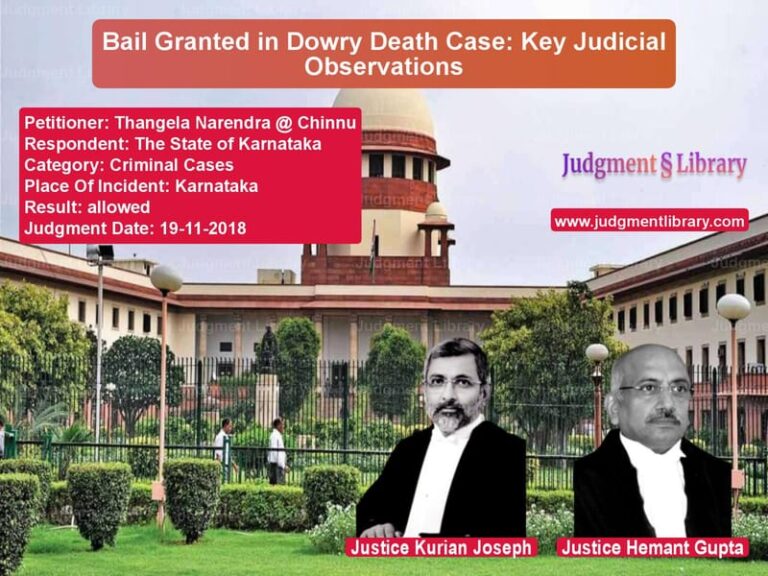Supreme Court Upholds Reservation for Hindu Nadar Community in Government Appointments
The Supreme Court of India, in the case of Dr. Aswathy R.S. Karthika & Ors. vs. Dr. Archana M. & Ors., addressed the implementation of reservation for the Hindu Nadar community in government job appointments in Kerala. The judgment clarified how shortfalls in reservation must be adjusted and upheld the Kerala Administrative Tribunal’s directive to compensate for the backlog of unfulfilled reserved vacancies.
The case involved the selection process for the post of Medical Officer (Homeopathy) in the Kerala government. The appellants, belonging to the Hindu Nadar community, challenged the Kerala Public Service Commission (PSC) for not adequately implementing their 1% reservation quota. The Supreme Court restored the Tribunal’s decision, ensuring that vacancies reserved for Hindu Nadars were filled from the latest rank list.
Background of the Case
The Kerala government issued a notification on November 21, 2009, including the Hindu Nadar community in the Other Backward Classes (OBC) category and granting them a 1% reservation. However, due to delays in implementing the rule, the reservation quota was not properly fulfilled in the Medical Officer (Homeopathy) selection process. The appellants applied for the post under the Hindu Nadar quota but were not appointed, prompting them to seek legal recourse.
The Kerala Administrative Tribunal directed the Public Service Commission to fill the shortfall from the succeeding rank list, but the Kerala High Court overturned this decision. The Supreme Court was then approached to decide whether the Tribunal’s order should be reinstated.
Arguments of the Petitioner
The appellants argued:
- The failure to appoint Hindu Nadar candidates in previous recruitment cycles resulted in a backlog of unfulfilled reserved posts.
- The Public Service Commission was obligated to compensate for the shortfall by adjusting future vacancies.
- Their exclusion from appointments violated Article 16(4) of the Constitution, which mandates adequate representation for backward communities in public employment.
- The Kerala High Court erred in disregarding the Tribunal’s order that sought to correct historical underrepresentation.
Arguments of the Respondent
The respondents, including general category candidates, contended:
- The appointments had already been made based on merit lists, and retrospective adjustments would be unfair.
- The backlog vacancies could not be carried forward indefinitely and should have been filled within the selection year.
- The Kerala Public Service Commission had followed legal procedures and had no obligation to go beyond the existing rank list.
Supreme Court’s Key Findings
1. Legality of the Reservation Policy
The Court reaffirmed that reservations for backward communities must be effectively implemented and that unfulfilled quotas should be adjusted in subsequent selection processes.
“The Public Service Commission is obligated to ensure that reserved vacancies are not permanently lost due to administrative delays.”
2. Adjustment of Shortfall in Reserved Quotas
The Court interpreted Rule 15(a) of the Kerala State and Subordinate Service Rules, stating:
“Where a reserved vacancy remains unfilled due to non-availability of candidates, the shortfall must be compensated in future recruitments without disturbing already made appointments.”
3. Role of the Public Service Commission
The Court found that the PSC had admitted a shortfall in the Hindu Nadar quota but failed to take corrective measures. It ruled:
“The Commission cannot deny legitimate reservations by citing procedural limitations when constitutional principles of social justice demand fulfillment of quotas.”
4. Overruling the High Court’s Judgment
The Supreme Court held that the Kerala High Court wrongly ignored the Tribunal’s directions and failed to protect the reservation rights of Hindu Nadars.
“The High Court’s approach was contrary to the established principles of reservation law, which seek to ensure fair representation of backward communities.”
Final Judgment
The Supreme Court:
- Allowed the appeal and restored the Kerala Administrative Tribunal’s order.
- Directed the Kerala Public Service Commission to adjust the backlog of Hindu Nadar vacancies in the latest recruitment cycle.
- Clarified that future shortfalls in reserved quotas must be compensated in subsequent recruitments.
Key Takeaways from the Judgment
- State governments must ensure effective implementation of reservation policies.
- Shortfalls in reserved quotas must be adjusted in future recruitments.
- The judiciary plays a crucial role in safeguarding the rights of backward communities.
- Public Service Commissions cannot ignore reservation obligations due to administrative delays.
Conclusion
The Supreme Court’s decision in Dr. Aswathy R.S. Karthika & Ors. vs. Dr. Archana M. & Ors. strengthens the enforcement of reservation policies and ensures that backward communities receive their rightful representation in government jobs. The judgment reaffirms the constitutional commitment to social justice and upholds the integrity of affirmative action measures.
Petitioner Name: Dr. Aswathy R.S. Karthika & Ors..Respondent Name: Dr. Archana M. & Ors..Judgment By: Justice Hemant Gupta.Place Of Incident: Kerala.Judgment Date: 29-07-2020.
Don’t miss out on the full details! Download the complete judgment in PDF format below and gain valuable insights instantly!
Download Judgment: Dr. Aswathy R.S. Kar vs Dr. Archana M. & Ors Supreme Court of India Judgment Dated 29-07-2020.pdf
Direct Downlaod Judgment: Direct downlaod this Judgment
See all petitions in Recruitment Policies
See all petitions in Public Sector Employees
See all petitions in Promotion Cases
See all petitions in Judgment by Hemant Gupta
See all petitions in allowed
See all petitions in supreme court of India judgments July 2020
See all petitions in 2020 judgments
See all posts in Service Matters Category
See all allowed petitions in Service Matters Category
See all Dismissed petitions in Service Matters Category
See all partially allowed petitions in Service Matters Category


